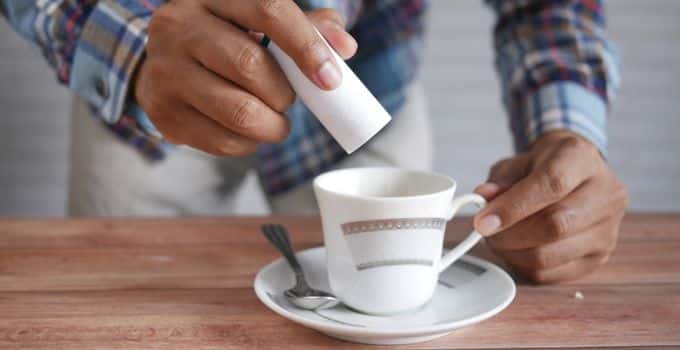Are you tired of drinking only water, black coffee, or unsweetened tea?
Artificial sweeteners might be your go-to solution if you are currently on your intermittent fasting journey.
But are these artificial sweeteners keeping you in your fast?
In this article, we will discuss the advantages and disadvantages of adding artificial sweeteners to your beverage of choice.
We will also discuss the different types of artificial sweeteners like Splenda, stevia, or aspartame so you can decide which one is better for you.
Most Common Artificial Sweeteners

Artificial sweeteners are sugar substitutes that provide a sweet taste without sugar’s added calories or adverse health effects.
They are often used in food and drink products as a sugar-free alternative for those looking to manage their weight, blood sugar levels, or dental health. Each artificial sweetener has its own unique properties and uses, which we explain in the following section.
Sucralose (Splenda)
Sucralose is a popular artificial sweetener often used in baked goods, dairy products, and beverages. It is made by chemically modifying sugar to create a compound around 600 times sweeter than sugar.
For example, sucralose is made by modifying the molecular structure of sugar to create a compound that is much sweeter than sugar but is not metabolized by the body in the same way.
This means that sucralose passes through the body without being broken down and contributes no calories to the diet.
Stevia
Another method for creating artificial sweeteners is to use natural plant extracts, such as stevia. Stevia is derived from the leaves of the Stevia rebaudiana plant and is much sweeter than sugar but contains no calories.
This is because the active compounds in stevia are not broken down by the body like sugar and are excreted without being metabolized.
It is often used in natural and organic food products and is around 200-300 times sweeter than sugar.
Aspartame (Equal)
Aspartame is among the most widely used artificial sweeteners, often in sugar-free beverages and desserts. It comprises two amino acids, phenylalanine, and aspartic acid, and is around 200 times sweeter than sugar.
Aspartame is made by combining two amino acids, phenylalanine, and aspartic acid, to create a compound that is much sweeter than sugar but does not contribute any calories to the diet.
Saccharin
Saccharin is one of the oldest artificial sweeteners, around 300-400 times sweeter than sugar. It is often used in processed foods and beverages and is available as a tabletop sweetener.
Saccharin is made from o-toluene sulfonamide, a chemical derived from coal tar. This compound is chemically modified to create a much sweeter substance than sugar but contains no calories.
Related Article: Does Coke Zero Break A Fast
Artificial Sweeteners And Intermittent Fasting

Artificial sweeteners are often marketed as a way to enjoy the sweet taste of sugar without the negative effects on blood sugar levels. However, research has shown that artificial sweeteners can still impact insulin and sugar spikes in the body.
Having said that, not all artificial sweeteners are created equal, and not all fasting methods have the same objective.
There is no definite answer that applies to all sweeteners for people who are fasting. Doctors have even suggested that fasting people try the sweetener and continue using it if they get good results.
Fasting has benefits, like losing weight, improving your concentration, and improving your overall health.
People have also been known to get sick and suffer from headaches and constipation while fasting, so fasting does come with risks.
Related Article: Can You Eat Pickles While Fasting
Benefits Of Artificial Sweeteners

Lower Glycemic Index
The most obvious benefit is you can make your drinks taste sweeter, and you don’t have an increase in insulin production which allows you to stay in fast. While these sweeteners taste sweet, the insulin response is lower, sometimes zero.
You Don’t Add As Many Calories To Your Beverage
While it’s true that these replacements still have calories, they don’t have as many as regular ones do. These replacements can claim they have no calories because they have such a small amount of calories that artificial sweeteners wouldn’t impact the person who uses them.
They Are Utilized In Diets Meant To Reduce Weight
When someone decides to go on a diet to lose weight, they may have a lot of natural sugar. If someone is trying to cut sugar from their diet, it’s tough to do that successfully cold turkey. Artificial Sweeteners can be what someone uses as a substitute until they are ready to remove sugar from their diet.
Improve Dental Health
Since artificial sweeteners don’t have sugar in their content, cavities are not a problem anymore. This is because the bacteria in the mouth that cause tooth decay thrive on sugar, and when sugar is present in the mouth, it can produce acid that erodes tooth enamel.
By consuming artificial sweeteners instead of sugar, there is less sugar in the mouth for bacteria to feed on, which can help protect teeth.
Drawbacks Of Using Artificial Sweeteners

Ingredients in Sweeteners Aren’t Natural
Humans make many ingredients and sweeteners. Since humans made the ingredients, they might not be something people should put in their bodies.
Your Craving For Sugar May Not Be Satisfied
These sweeteners are not sugar substitutes. If you still crave sugar and those cravings aren’t satisfied, you could consume more sugar than you would otherwise.
Different Ways Sweeteners Are Used
Artificial sweeteners are commonly used as a sugar substitute in various food and beverage products. Here are some of the most common ways in which artificial sweeteners are used:
- Diet soda: Artificial sweeteners like aspartame, sucralose, and saccharin are often used to sweeten diet soda, marketed as a healthier alternative to regular soda.
- Sugar-free gum: Many types of gum are sweetened with artificial sweeteners like xylitol, which can help prevent tooth decay and maintain good oral hygiene.
- Baked goods: Artificial sweeteners like stevia and erythritol can be used to sweeten cakes, cookies, and other desserts without adding calories.
- Coffee and tea: Some people use artificial sweeteners instead of sugar to sweeten their coffee and tea, which can help reduce their calorie intake.
- Low-calorie foods: Artificial sweeteners are often used in low-calorie foods like yogurt, pudding, and ice cream to provide a sweet taste without adding extra calories.
While artificial sweeteners can be a helpful tool for reducing calorie intake, it’s important to use them in moderation and consider the potential health risks associated with long-term use.
Final Thoughts
There are benefits and drawbacks to using artificial sweeteners instead of sugar.
Sweeteners are used much more than many people may realize.
If you are fasting, you can still have sweeteners, but it’s best to keep track of how you feel afterward and monitor results on a weekly basis to understand your specific needs.